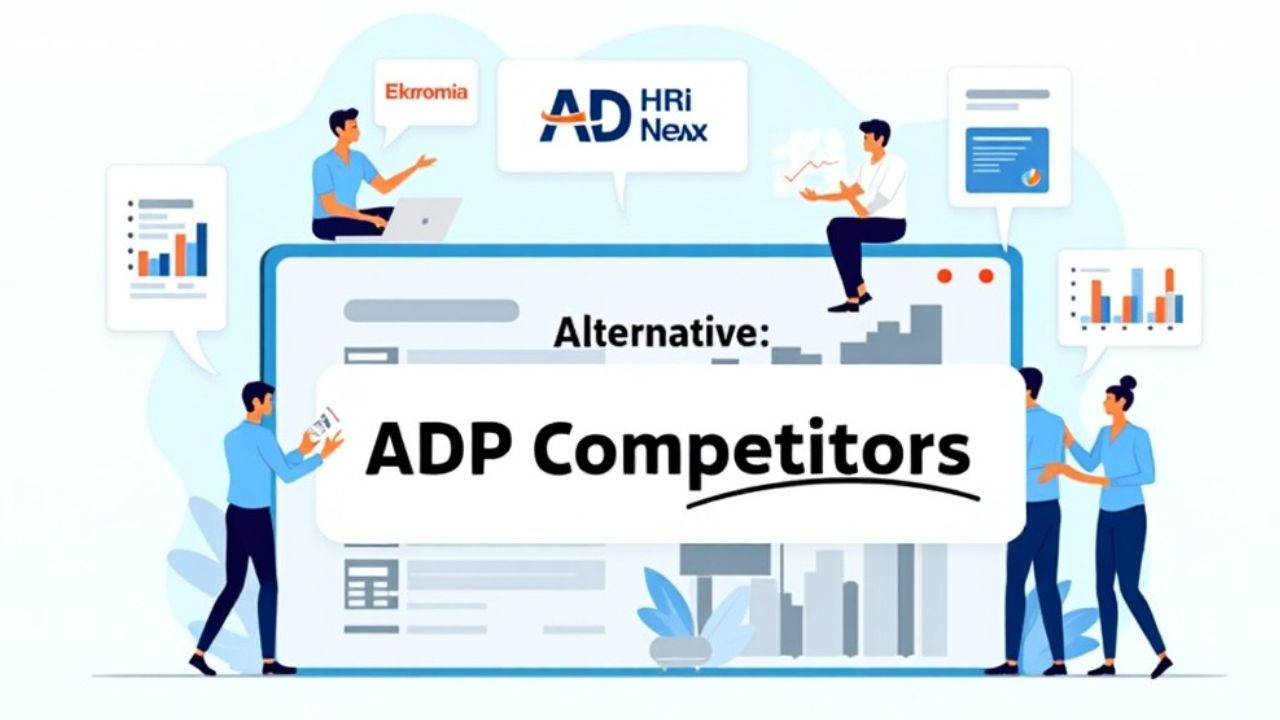When it comes to payroll and HR, ADP (Automatic Data Processing) is a name that almost every business has heard of. It’s one of the oldest and most trusted companies in this space, powering payroll and workforce solutions for millions of businesses worldwide. From paying employees on time to managing benefits and staying compliant with ever-changing labour laws, ADP has built a reputation as the “go-to” provider for companies of all sizes.
But here’s the thing—while ADP is a leader, it’s not the only option out there. Businesses often find that ADP’s services can be more expensive, a little too complex for smaller teams, or not as flexible as they’d like. That’s where ADP competitors step in—offering payroll and HR solutions that are sometimes simpler, cheaper, or better suited for specific industries.
In this blog, we’ll explore who ADP’s main competitors are in 2025, what makes them strong alternatives, and how you can choose the right payroll provider for your business.
What Does ADP Offer?
ADP is not a mere payroll company; it is an HR powerhouse. Through the years, the company has grown to cover more than just processing paychecks to virtually all aspects of workforce management. The following is what ADP normally offers:
- Payroll Processing: Processes all the calculations of wages and deductions, as well as the direct deposits.
- Tax Filing/Compliance: Ensures that businesses remain in compliance with the federal, state, and local taxation laws.
- Benefits Administration: Assists in the management of health insurance, retirement plans, and employee perks.
- Time & Attendance: Records the hours, schedules and overtime of the employee using the built-in features.
- Talent Management: it offers recruitment, onboarding, and performance tracking services.
- HR Outsourcing (ADP TotalSource): This is a professional employer organisation (PEO) that is offered to businesses that desire to completely outsource HR.
In brief, ADP can be scaled, regardless of your company size: 10 10-employee startup or a multinational one with thousands of employees.
Why businesses look for ADP alternatives
Although ADP is a large company, it is not an ideal fit. Among the typical reasons that businesses start to consider alternatives:
- Expenses: ADP will be expensive, particularly to small businesses that are mindful of costs.
- Difficulty: On the one hand, there are many features, but on the other hand, it may be cumbersome when you simply need payroll without all the extra features.
- Pricing: The prices of ADP are not always transparent, and this aspect can be irritating to businesses when comparing the provider.
- Customer Experience: The users complain that there are delays in response times or support problems.
- Flexibility: Some of the businesses require more customisation or lightweight tools that are not always offered by ADP.
That is why most of the companies, in particular, start-ups, small enterprises, and intermediate companies, turn to the option of checking the competitors of ADP to find whether they could obtain the same quality service in a more convenient or more affordable form.
Comparison Table: ADP vs Competitors
| Provider | Key features | Pricing (Starting) | Best for |
| ADP | Full-service payroll, HR, compliance, benefits, time tracking, global reach | Custom pricing (varies by plan) | Large businesses & enterprises needing scalability |
| Paychex | Payroll, tax filing, HR, retirement plans, employee benefits | From ~$39/mo + $5/employee | Small to mid-sized businesses with HR needs |
| Workday | Enterprise HR, payroll, analytics, workforce planning | Custom enterprise pricing | Large enterprises focused on HR + finance integration |
| Gusto | Easy payroll, benefits, compliance, onboarding, employee self-service | From $40/mo + $6/6/6/employee | Startups & small businesses wanting simplicity |
| Rippling | Payroll, IT + HR integration, device/app management | From $8/employee per month | Tech-driven businesses need an all-in-one platform |
| Paycom | Payroll, HR, talent management, mobile-first tools | Custom pricing | Mid-sized to large businesses wanting automation |
| QuickBooks Payroll | Payroll, tax filing, QuickBooks integration, benefits | From $45/mo + $5/employee | Small businesses already using QuickBooks |
| Trinet | PEO services, HR outsourcing, compliance, benefits | Custom pricing (PEO model) | Small to mid-sized businesses wanting HR outsourcing |
| Justworks | Payroll, benefits, compliance, PEO model | From $59/employee per month | Startups & small companies needing simple HR/PEO |
| Insperity | PEO services, HR consulting, compliance, performance management | Custom pricing (PEO model) | Businesses needing HR expertise & compliance |
| Square Payroll | Payroll, contractor payments, and integrations with Square POS | $35/mo + $6/employee OR $6/contractor | Very small businesses, retail, and contractors |
ADP Competitors (Top 10 ADP Alternatives in 2025)
1. Paychex
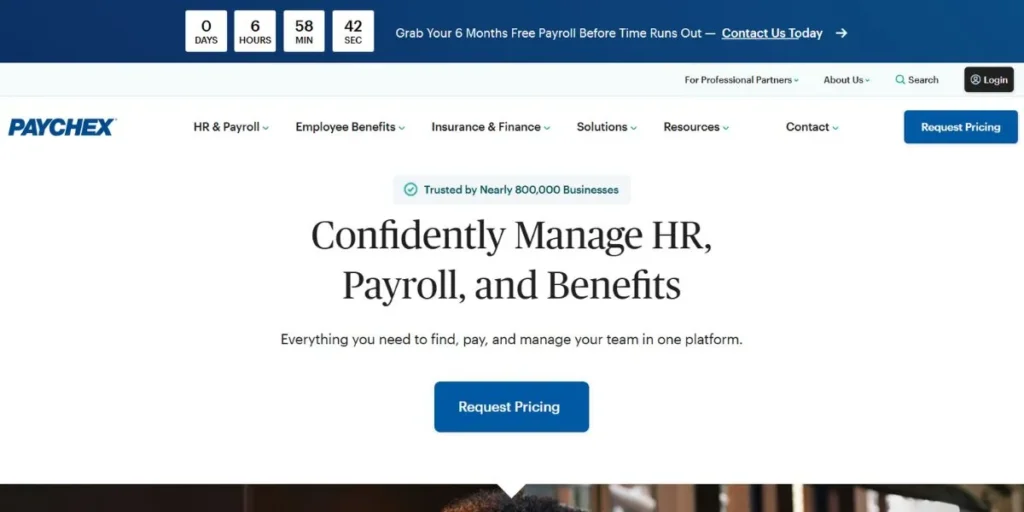
Paychex has been one of the largest competitors of ADP, and it serves in excess of 700,000 businesses in the U.S. It provides benefits, payroll, and HR solutions that are growing with the scale of the company, hence fit well in small to midsize companies. The only difference is that Paychex is flexible-it is possible to begin with only payroll and add HR and compliance solutions with the expansion. Paychex has good customer service and is known to be a reliable choice; so when ADP is seen to be too complicated or too expensive, Paychex is always the first alternative business that customers would consider.
Key Features:
- Payroll processing with tax filing
- Time and attendance tracking
- Employee benefits management
- HR consulting and compliance tools
Pros:
- Scales well for SMBs
- Strong customer service reputation
- Flexible service packages
Cons:
- Pricing is not always transparent
- It can be costly for very small businesses
Pricing: Starts around $39/month + $5 per employee
Website: paychex.com
2. Workday
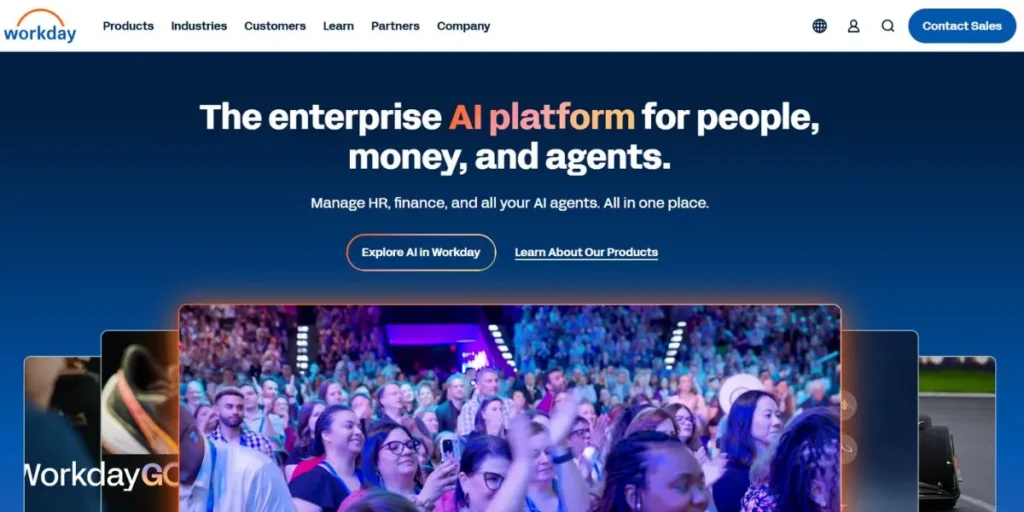
Workday is a multinational enterprise HR and finance software provider, competing with ADP in the upper segment of the market. It offers a complete cloud-based platform of payroll, workforce planning, talent management and financial analytics. Big companies prefer Workday due to its effective reporting features, scalability, and the capacity to manage international activities. Although it is more costly and complicated compared to other providers, Workday is one of the most suitable options that an enterprise can choose in order to have a single HR and financial management system.
Key Features:
- Enterprise HR and payroll management
- Workforce planning and analytics
- Cloud-based HCM and ERP integration
- Global payroll and compliance
Pros:
- Best for large enterprises
- Strong reporting and data analytics
- Handles global workforce needs
Cons:
- Expensive and complex
- Not suitable for small businesses
Pricing: Custom pricing
Website: workday.com
3. Gusto
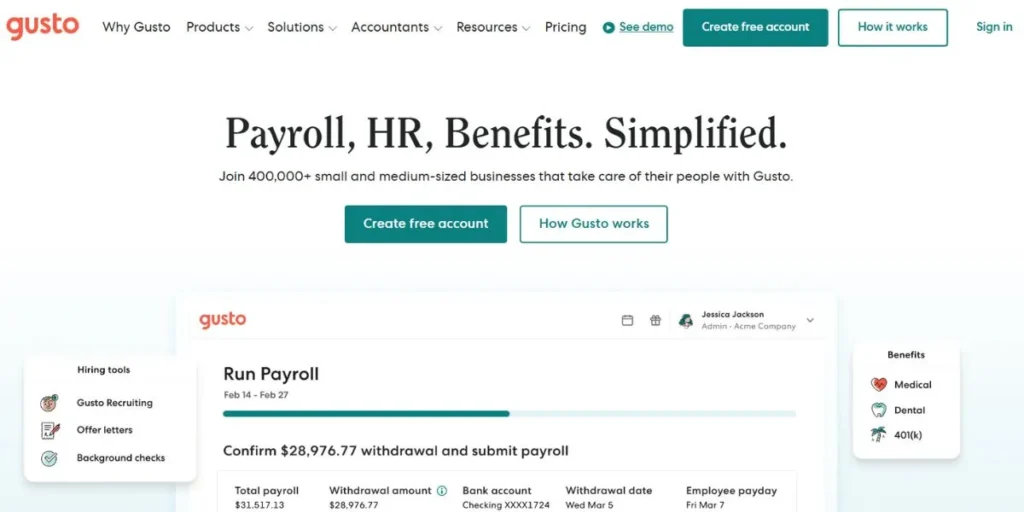
Gusto is now a popular payroll provider among startups and small businesses that prefer to use a simple and affordable solution. It offers time tracking, compliance, employee benefits, and payroll in a clean, modern interface. In contrast to ADP, Gusto has clear and easy-to-read pricing, which makes it particularly appealing to companies with a tight budget. The fact that it is easy to use is aimed at business owners who lack HR skills, and this is why many small teams perceive Gusto as the smarter choice over ADP.
Key Features:
- Automated payroll with tax filing
- Employee benefits and health insurance
- Onboarding and employee self-service
- Time tracking and compliance support
Pros:
- Transparent, affordable pricing
- Very user-friendly interface
- Designed for small businesses and startups
Cons:
- Limited for large or complex organisations
- Fewer international payroll options
Pricing: Starts at $40/month + $6 per employee
Website: gusto.com
4. Rippling
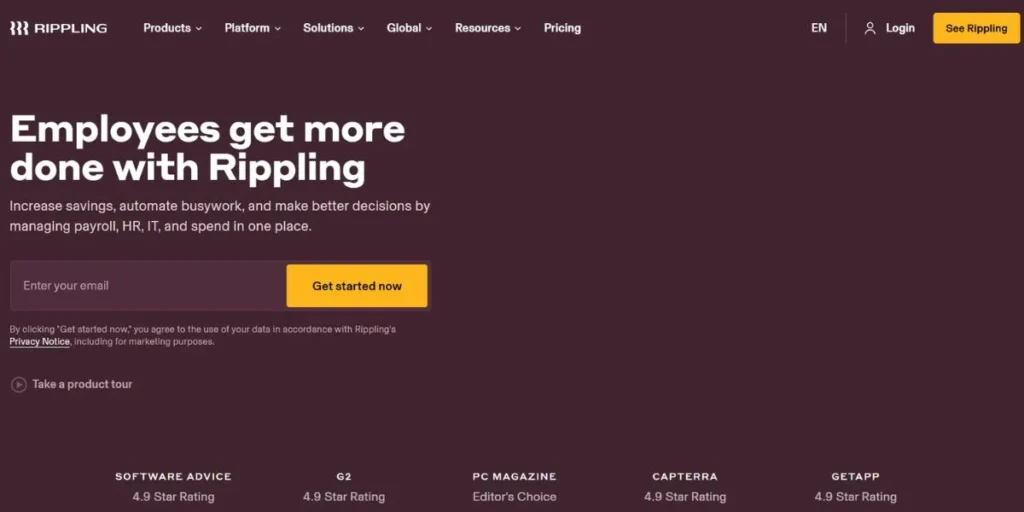
One of the latest yet fastest-emerging competitors of ADP in payroll and HR is Rippling. Its unique attribute is that it can conduct not only payroll and benefits but also IT-related tasks such as employee gadgets and application access. Time saving is an all-in-one strategy in companies that grow rapidly and desire to automate their operations and integrate flawlessly with more than 500 third-party applications. Rippling is popular,, particularly among technology-oriented companies that appreciate flexibility and current working processes. Its cost may be very cumulative with additions, yet it is very useful when developing large groups.
Key Features:
- Payroll and HR management in one
- IT management (devices & apps)
- Benefits and compliance tools
- Integrates with 500+ third-party apps
Pros:
- Highly flexible and customizable
- Automation reduces manual work
- Strong integrations for modern workflows
Cons:
- Add-ons increase cost quickly
- It may be too advanced for very small teams
Pricing: Starts at $8 per employee/month
Website: rippling.com
5. Paycom
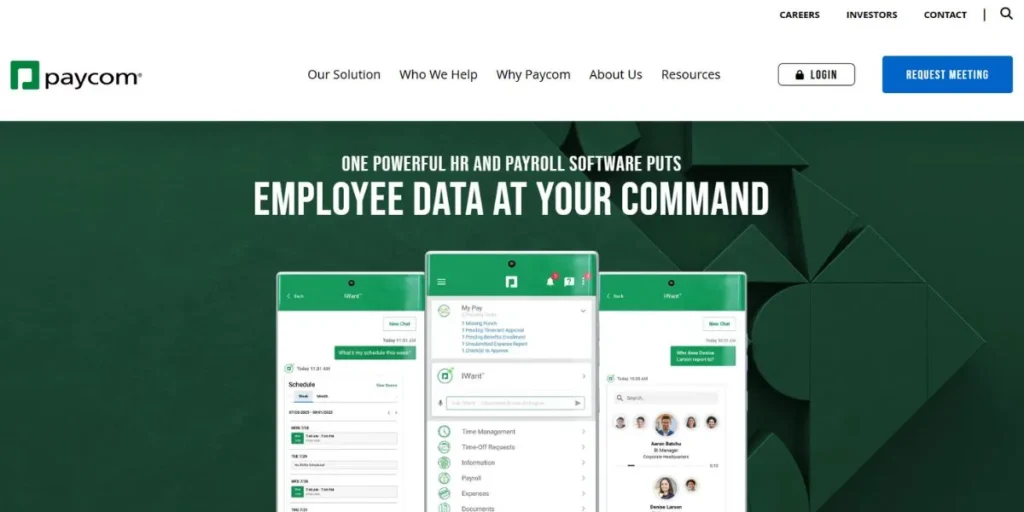
Paycom is an enterprise that has gained a niche in the payroll market with its employee-centred payroll model, where people do the majority of their payroll information via a self-service application. This minimises mistakes and conserves HR departments” time. Besides the payroll, Paycom also has talent management, compliance, and reporting functionality within a single system. It is a robust option among mid to large-sizedd enterprisesthato would like to have a complete package with efficiency in mind. Its greatest disadvantage is that it is transparent in terms of pricing, but it has a solid platform and can be considered a good rival to ADP.
Key Features:
- Employee-driven payroll system
- All-in-one HR and compliance platform
- Talent management and recruiting tools
- Detailed workforce reporting
Pros:
- Reduces payroll errors
- Strong employee self-service app
- Comprehensive HR features
Cons:
- Pricing not disclosed publicly
- Setup can be time-consuming
Pricing: Custom quotes only
Website: paycom.com
6. QuickBooks Payroll

QuickBooks Payroll is targeted to small businesses, particularly those that are already using QuickBooks to do their accounting. It provides convenient payroll processing, auto tax filing and direct deposit,,s and these are closely related to financial records. It is an excellent option among business owners who lack an HR background since the platform is easy to establish and operate. Although it does not scale as well as ADP or Paychex, it is affordable and easy to use, which is why it is a viable choice that can be used by small teams.
Key Features:
- Payroll with automated tax filing
- Direct deposit and contractor payments
- Seamless QuickBooks integration
- Employee self-service portal
Pros:
- Works perfectly with QuickBooks accounting
- Easy to use for small businesses
- Affordable and straightforward setup
Cons:
- Limited advanced HR functions
- Not ideal for larger organisations.
Pricing: Starts at $45/month + $5 per employee
Website: quickbooks.intuit.com/payroll
7. TriNet
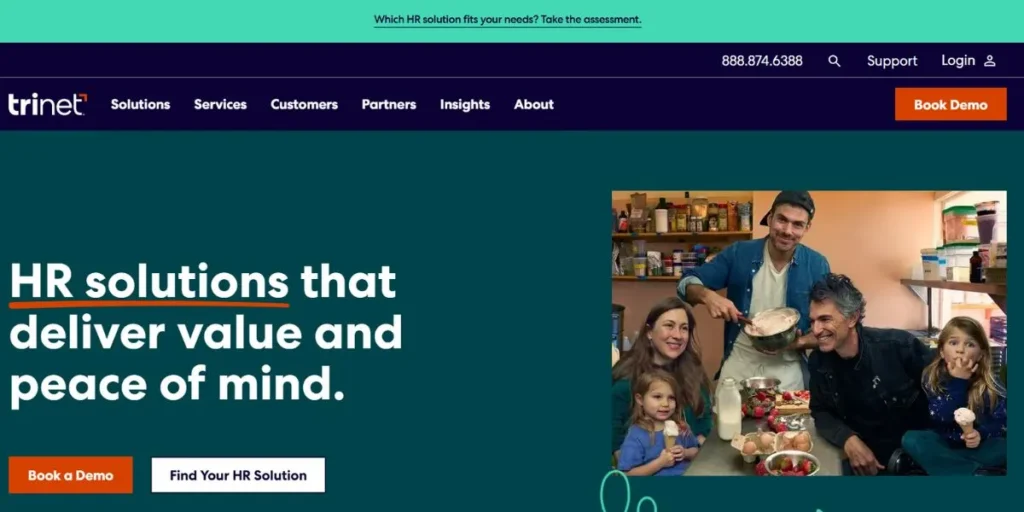
One of the famous professional employer organisations (PEOss) that offers full HR outsourcing to small and midsize businesses is called TriNet. It manages payroll, employee benefits, risk management and compliance under a single umbrella. Through the association with TriNet, companies can noo access benefits packages similar to those of large enterprises that they would not have negotiated individually. Although it is a less personalised option compared to some of the self-service payroll solutions, it is a good optionfforo a company that would rather not deal with HR and concentrate on growth.
Key Features:
- Full-service PEO for SMBs
- Payroll, benefits, and compliance
- Risk management services
- Access to enterprise-level benefits
Pros:
- Strong HR outsourcing model
- Great for small businesses seeking big-company perks
- Helps reduce compliance risks
Cons:
- Less customizable than DIY payroll tools
- Pricing can be higher than SaaS competitors
Pricing: Custom pricing
Website: trinet.com
8. Justworks
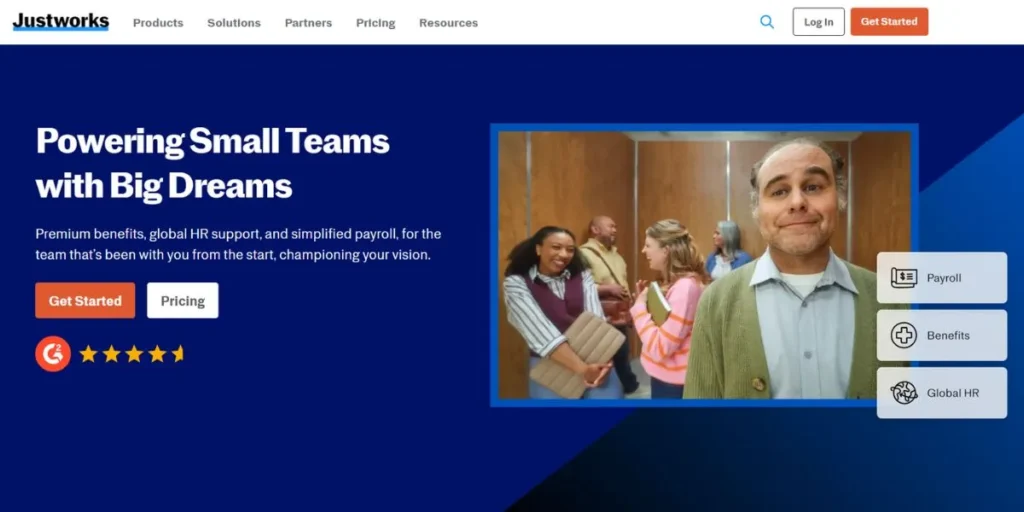
Another competitor, which is also strong in PEO, is Justworks, which makes HR and payroll simple and easy to use by startups and small businesses. It is a package of payroll, compliance and staff benefits, such as health insurance and retirement plans, into a platform that is easy to use. Justworks is known to be transparent and modern and attracts teams who desire the benefits of an HR outsourcing but not the complexity of an enterprise system. Particularly with startups that grow fast, it is very popular because it must provide competitive advantages within a short time.
Key Features:
- Payroll and HR outsourcing
- Employee benefits (health, dental, retirement)
- Compliance and risk management
- Easy-to-use platform with modern design
Pros:
- Transparent pricing
- Ideal for startups and small teams
- Simplifies HR and payroll
Cons:
- Limited advanced features for large enterprises
- Less global reach than ADP or Workday
Pricing: Starts at $59/month per employee
Website: justworks.com
9. Insperity
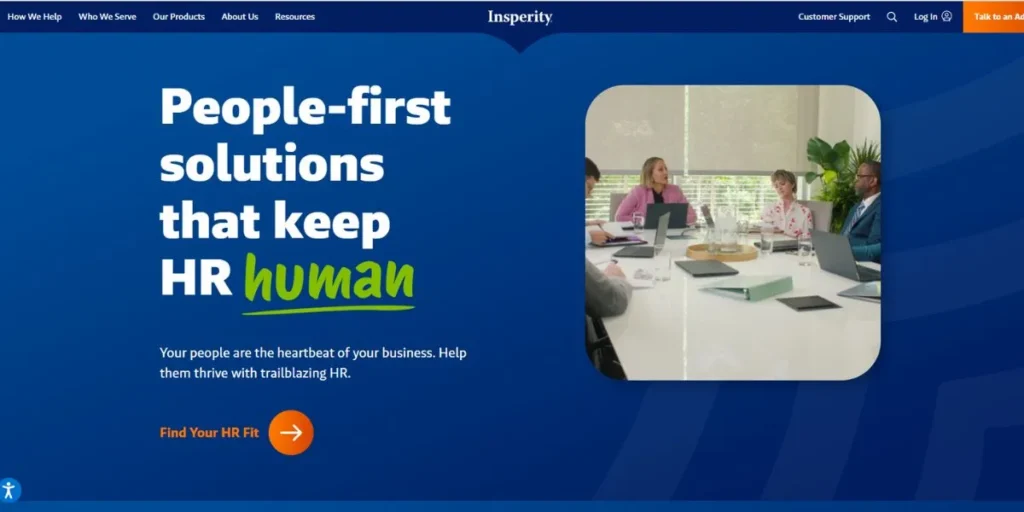
Insperity offers payroll and HR outsourcing services that are customised according to the needs of small and mid-sized businesses that require professional service. Besides payroll and benefits, Insperity provides training programs, employee development and risk management services. The reason why businesses tend to select Insperity is that they prefer a partner who has a hands-on approach to addressing compliance and HR strategy. Although it might lack the technological advantage of Rippling or Gusto, its robust advisory strategy makes it a reliable brand for companies that require guidance, as well as payroll.
Key Features:
- Payroll and HR outsourcing services
- Employee training and development
- Risk management and compliance support
- Benefits administration
Pros:
- Hands-on HR guidance and consulting
- Strong compliance and risk support
- Tailored for small and midsize businesses
Cons:
- Pricing not transparent
- The tech platform is less advanced than the newer players
Pricing: Custom quotes
Website: insperity.com
10. Square Payroll
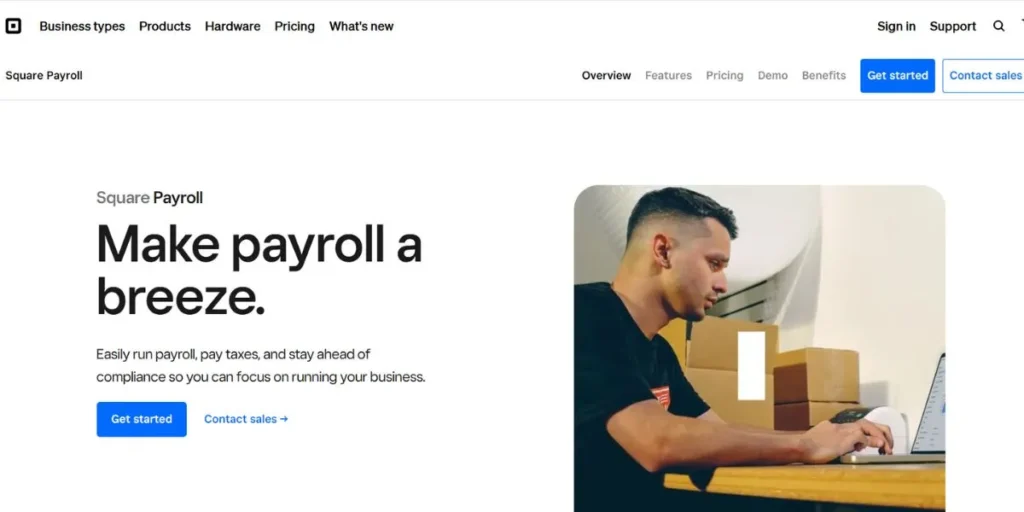
Square Payroll is designed to target small businesses with the need to have a simple, low-cost payroll system. It is considered to be a natural variant of Square POS (point-of-sale) system, thus it is applicable in restaurants, retail stores, and businesses that provide their services. Square Payroll is able to conduct direct deposits, tax filings and make payments to the contractors easily. It does not have all the features of ADP or Paychex, but for small teams working with a tight budget, Square Payroll is one of the most feasible options.
Key Features:
- Payroll for employees and contractors
- Automated tax filing
- Direct deposit
- Seamless integration with Square POS
Pros:
- Very affordable for small businesses
- Great for retail, restaurants, and service-based companies
- Easy setup and integration
Cons:
- Limited HR and benefits features
- Best only for small teams
Pricing: $35/month + $6 per employee OR $6/month per contractor
Website: squareup.com/payroll
How to Choose the Right ADP Alternative
There are countless payroll and human resource solutions, so you will be overwhelmed by the number of options in the market. The thing is–there is no ready-to-wear. The right ADP option will be based on the size of your company, your budget, and what matters most to you: simplicity, advanced HR tools, or cost savings. The following are some of the considerations:
- Business Size and Needs: Small enterprises can be satisfied with the simplicity and price-efficiency of such options as Gusto or Square Payroll, whereas mid-size and large organisations may require powerful software such as Workday or Paycom.
- Features That Matter: List features that you must have. And do you require only payroll, or complete HR, compliance and benefits management as well? Rippling or TriNet might suit you better if you want to have an all-in-one system.
- User-friendly: When you do not have a full-time HR team, a user-friendly product, such as Justworks or QuickBooks Payroll, can save you time and headaches.
- Scalability: Where is your business going? An expanding organisation can become too large to use a basic payroll program and will need something more sophisticated in the future.
- Pricing: The prices may be quite different. Some are based on a monthly fee per employee, and others include set-up fees or service fees. Never look at the total pricing only,not base fees.
- Industry Fit: In complex HR compliance requirements, some of the providers, such as Insperity or TriNet, are good.
The trick is to find a compromise between functionality and affordability. Alternatively to selecting the most popular brand, select the platform that can suit your current needs and expand with your business.
Conclusion
ADP has been a payroll and HR leader, but this is not the only option that businesses will use in 2025. If your size, industry and budget allow it, several alternatives can be more suitable. Small enterprises in search of low-cost and user-friendly payroll solutions should consider platforms such as Gusto and Square Payroll. Conversely, the bigger companies might be inclined towards Workday, Paycom, or Rippling because of their scalability and high-level HR.
The bottom line: the most desirable payroll solution is the one that may be adjusted in terms of price, functionality and usability to your specific business. You are advised to choose the provider that will best suit your business, whether it is in the short term or long term, by comparing providers, considering what is important to you and settling on the best provider that will see your business operating smoothly.
FAQs
Who are ADP’s main competitors?
The largest rivals of ADP are Paychex, Workday, Gusto, Rippling, Paycom, QuickBooks Payroll, TriNet, Justworks, Insperity, and Square Payroll.
Is Workday better than ADP?
It will be dependent on your business requirements. Workday tends to be more powerful with large businesses that have complicated HR and financial requirements, and ADP has more adaptable payroll and human resource options with large businesses of any size.
Is ADP the biggest payroll company?
Yes, ADP is also among the largest payroll providers in the world, with a population of more than 1 million customers. Nevertheless, other competitors such as Paychex and Workday also have very high market share.
Who competes with ADP TotalSource?
The ADP TotalSource, which is the PEO service of ADP, competes primarily with TriNet, JustWorks and Insperi, which also provide PEO services.
What payroll company is best for small businesses?
In the case of small companies, Gusto, Square Payroll, and QuickBooks Payroll can be the most suitable choices due to their low prices, simplicity of use, and rapid installation.
